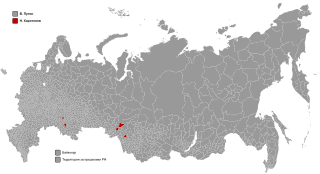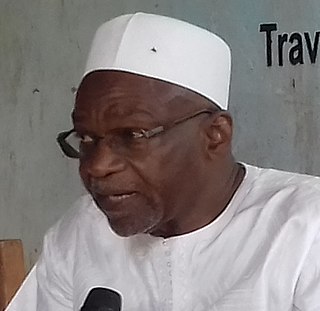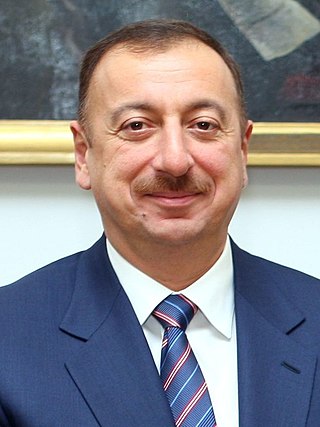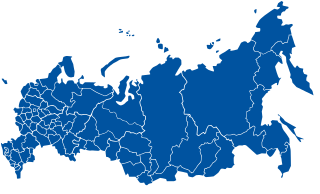Related Research Articles
The implementation of the Dayton Accords of 1995 has focused the efforts of policymakers in Bosnia and Herzegovina, as well as the international community, on regional stabilization in the countries-successors of the former Yugoslavia. Relations with its neighbors of Croatia, Montenegro and Serbia have been fairly stable since the signing of the Dayton Agreement in 1995.

The European Commission (EC) is part of the executive of the European Union (EU), together with the European Council. It operates as a cabinet government, with 27 members of the Commission headed by a President. It includes an administrative body of about 32,000 European civil servants. The Commission is divided into departments known as Directorates-General (DGs) that can be likened to departments or ministries each headed by a Director-General who is responsible to a Commissioner.

The European Union (EU) has expanded a number of times throughout its history by way of the accession of new member states to the Union. To join the EU, a state needs to fulfil economic and political conditions called the Copenhagen criteria, which require a stable democratic government that respects the rule of law, and its corresponding freedoms and institutions. According to the Maastricht Treaty, each current member state and the European Parliament must agree to any enlargement. The process of enlargement is sometimes referred to as European integration. This term is also used to refer to the intensification of co-operation between EU member states as national governments allow for the gradual harmonisation of national laws.

Presidential elections were held in Russia on 14 March 2004. Incumbent President Vladimir Putin was seeking a second full four-year term. It was a landslide victory for Putin, who was re-elected with 71.9% of the vote.
Regular elections in Croatia are mandated by the Constitution and legislation enacted by Parliament. The presidency, Parliament, county prefects and assemblies, city and town mayors, and city and municipal councils are all elective offices. Since 1990, seven presidential elections have been held. During the same period, ten parliamentary elections were also held. In addition, there were nine nationwide local elections. Croatia has also held three elections to elect members of the European Parliament following its accession to the EU on 1 July 2013.

The politics of Europe deals with the continually evolving politics within the continent of Europe. It is a topic far more detailed than other continents due to a number of factors including the long history of nation states in the region as well as the modern day trend towards increased political unity amongst the European states.

Belarus elects on national level a head of state—the president—and a legislature. The president is elected for a five-year term by the people. The National Assembly has two chambers. The House of Representatives has 110 members elected in single-seat constituencies elected for a four-year term. The Council of the Republic has 64 members, 56 members indirectly elected and eight members appointed by the president.

Election monitoring involves the observation of an election by one or more independent parties, typically from another country or from a non-governmental organization (NGO). The monitoring parties aim primarily to assess the conduct of an election process on the basis of national legislation and of international election standards. There are national and international election observers. Monitors do not directly prevent electoral fraud, but rather record and report instances of suspicious practices. Election observation increasingly looks at the entire electoral process over a long period of time, rather than at election-day proceedings only. The legitimacy of an election can be affected by the criticism of monitors, unless they are themselves seen as biased. A notable individual is often appointed honorary leader of a monitoring organization in an effort to enhance legitimacy of the monitoring process.

Presidential elections were held in Belarus on 19 March 2006. The result was a victory for incumbent, President Alexander Lukashenko, who received 84.4% of the vote. However, Western observers deemed the elections rigged. The Organization for Security and Co-operation in Europe (OSCE) declared that the election "failed to meet OSCE commitments for democratic elections". In contrast, election observers from the Commonwealth of Independent States (CIS) described the vote as open and transparent.

Parliamentary elections were held in Chad on Sunday, 13 February 2011, the first since 2002. The elections were originally scheduled for 28 November 2010, but were postponed following a meeting in September between the ruling party and opposition leaders. According to the National Independent Electoral Commission (CENI), this was due to timing constraints caused by complications encountered during electoral preparations.

Tonino Picula is a Croatian politician currently serving his third term as a Member of the European Parliament for Croatia, having successfully run in 2013, 2014, and 2019 European elections. He got involved in politics in the early 1990s and had served four consecutive terms as a member of the Croatian Parliament, having been elected in 2000, 2003, 2007, and 2011 parliamentary elections as a member of the center-left Social Democratic Party (SDP). He served as Minister of Foreign Affairs from 2000 to 2003 under prime minister Ivica Račan, and as mayor of Velika Gorica from 2005 to 2009.
The United Nations Peacekeeping efforts began in 1948. Its first activity was in the Middle East to observe and maintain the ceasefire during the 1948 Arab–Israeli War. Since then, United Nations peacekeepers have taken part in a total of 72 missions around the globe, 14 of which continue today. The peacekeeping force as a whole received the Nobel Peace Prize in 1988.

Presidential elections were held in Azerbaijan on 15 October 2008. Ilham Aliyev of the New Azerbaijan Party was re-elected with 89% of the vote. Several major political parties, including Musavat, the Azerbaijan Popular Front Party, Azerbaijan Liberal Party, and the Azerbaijan Democratic Party boycotted the vote because of alleged poll-fixing and oppression of political opponents.

The history of the European Union from 2004 to the present is the current timeline of the European union. It is a period of significant upheaval and reform following the 2004 enlargement of the European Union. The EU has taken on ten new members, eight of which were initially much poorer than the EU average, and took in a further two in 2007 with many more on the way. It created the euro a few years before and had to expand this, and the Schengen Area to its new members. However this was overshadowed by the late-2000s recession and damaging disputes over the European Constitution and its successor, the Treaty of Lisbon. Throughout this period, the European People's Party has been the largest group in the European Parliament and provides every President of the European Commission.

A referendum on the EU accession of the Republic of Croatia was held on 22 January 2012. Croatia finished accession (membership) negotiations on 30 June 2011 and signed the Treaty of Accession on 9 December 2011, setting it on course to become the bloc's 28th member state. The Constitution of Croatia requires that a binding referendum be held on any political union reducing national sovereignty, such as via European Union membership. On 23 December 2011 the Croatian Parliament made a preliminary decision on EU accession and determined that the referendum would be held on 22 January 2012. The 2012 Croatian EU accession referendum was the first referendum held in Croatia since the Croatian independence referendum held more than 20 years earlier, in 1991.

Presidential elections were held in Russia on 4 March 2012. There were five officially registered candidates: four representatives of registered parties, and one nominal independent. The election was the first one held after constitutional amendments were introduced in 2008, in which the elected president for the first time would serve a six-year term, rather than a four-year term.

The Organisation for Economic Co-operation and Development is an intergovernmental organisation with 38 member countries, founded in 1961 to stimulate economic progress and world trade. It is a forum whose member countries describe themselves as committed to democracy and the market economy, providing a platform to compare policy experiences, seek answers to common problems, identify good practices, and coordinate domestic and international policies of its members.
Aleksey Vladimirovich Kochetkov. Aleksey Kochetkov is a former engineer and political analyst well known for his closeness to official Russian policy under President Putin. He has often written in support Russia's occupation of Georgia, and also in support of pro-Moscow conspiracy theories in his book Neo-nazis and Maidan.

Presidential elections were held in Azerbaijan on 9 October 2013. The result was a victory for incumbent President Ilham Aliyev, who received a reported 84.5% of the vote, whilst leading opposition candidate Jamil Hasanli finished second with a reported 5.5% of the vote.
References
- ↑ "News from the Field: Strengthening the capacities of the new permanent State Election Commission in the Republic of Croatia". United Nations Democracy Fund. 2008-01-23. Archived from the original on 2011-06-23. Retrieved 2011-12-02.
- ↑ "GONG: 10th Anniversary, But In Financial Problems". dalje.com English Edition. 2007-04-12. Retrieved 2011-12-02.
- ↑ "Annual reports - How it all started?". GONG. 2008-07-23. Retrieved 2011-12-02.
- ↑ "Priopćenje U-VII-833-1998: HHO i GONG – sudjelovanje promatrača u izbornom postupku" (in Croatian). State Election Commission of the Republic of Croatia. 1998-10-09. Retrieved 2011-12-02.
- ↑ "Supporting minority elections in Croatia". Organization for Security and Co-operation in Europe. 2003-05-19. Retrieved 2011-12-02.
- ↑ "Civil Society organisations - Croatia". Civil Society Development in Southeast Europe: Building Europe Together. Brussels: Directorate-General for Enlargement (European Commission). 2009-11-25. Archived from the original on 2012-07-17. Retrieved 2011-12-02.